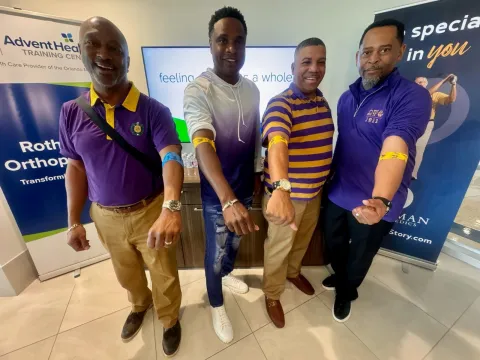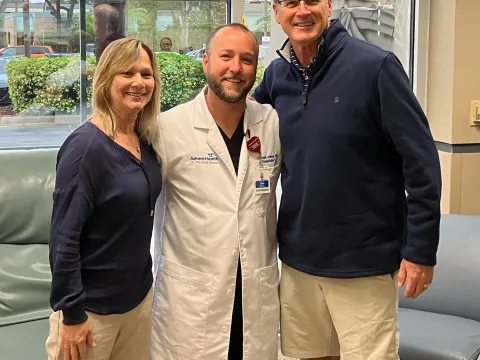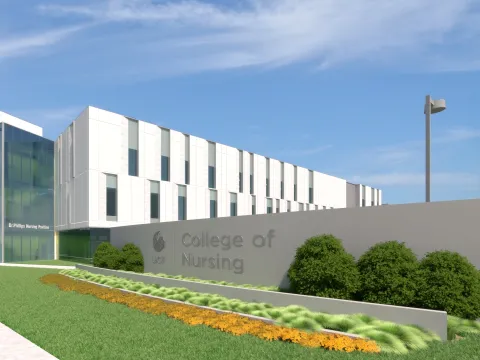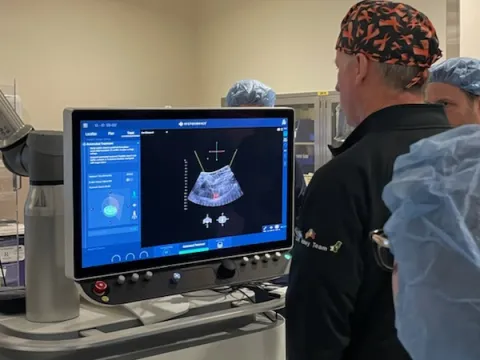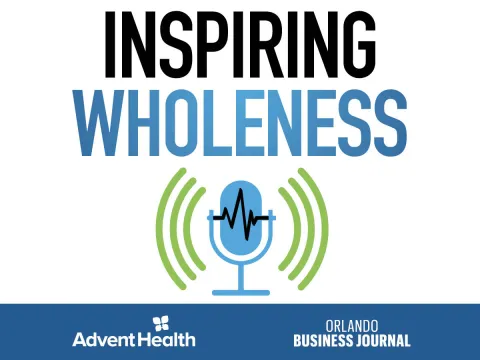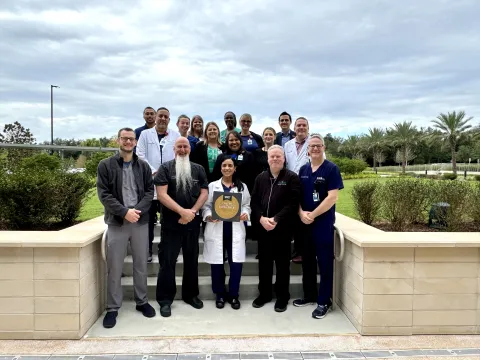- Matthew Gomez
Choose the health content that’s right for you, and get it delivered right in your inbox.
Q&A with Kambiz Kadkhodayan, M.D., leader in endobariatrics at AdventHealth Center for Interventional Endoscopy (CIE).
Obesity is a real health concern in the United States, and we’ve witnessed the negative impact it has had on many during the COVID-19 pandemic. What are you doing at the AdventHealth Center for Interventional Endoscopy (CIE) to help obese and critically overweight patients lead healthier lives?
Approximately 45% of the population in the United States is either overweight or obese. A large percentage of these patients develop obesity-related diseases, such as Type 2 diabetes, high blood pressure, fatty liver disease, coronary artery disease etc. Also, we’ve witnessed obesity and its multiple comorbidities place patients at high risk for poor outcomes when infected with COVID-19.
Robust clinical data shows a significant reduction in all-cause mortality, when patients lose weight. There was also a recent study that suggested improved clinical outcomes, in COVID positive patients with a history of obesity, who have received prior treatment resulting in meaningful weight loss. Here at AdventHealth, our multidisciplinary and comprehensive approach to obesity, can help our patients lead healthier and more productive lives.
What is endobariatrics? Is it a form of weight loss management?
Traditional treatment options for patients with obesity have included diet-lifestyle modification, pharmacotherapy and, ultimately, surgery. As most of us realize, diet-lifestyle modification, while an essential component of weight loss, can be difficult to maintain. Pharmacotherapy has limited efficacy when used alone as primary treatment. Surgery, on the other hand, is highly effective and is considered “the gold standard” for treatment of patients with body mass index (BMI) 40 kg/m2.
Obesity associated comorbidities, such as Type 2 Diabetes, high blood pressure, fatty liver disease, coronary artery disease, are serious concerns. Unfortunately, less than 2% of patients who qualify for surgery seem to follow through with it. The leading cause of not proceeding with surgery is fear of having an operation.
In recent years, the field of endobariatrics has emerged as a viable, incisionless, minimally invasive endoscopic alternative to surgery that bridges the gap between the diet-exercise, pharmacotherapy and surgery options.
How do endobariatrics procedures differ from traditional weight loss surgery methods?
With the use of a flexible endoscope, our CIE team will offer our patients incisionless, minimally invasive endoscopic procedures such as Endoscopic Balloon Therapy (EBT), Endoscopic Sleeve Gastroplasty (ESG) and Endoscopic Aspiration Therapy. Our treatment options are best suited for patients with a BMI of 30 to 40. While we encourage patients with BMI’s of > 40 to have surgery with our highly sought after and qualified surgeons, there are patients who do not wish to have surgery, and an endoscopic treatment may be an alternative option.
In addition, we offer endoscopic procedures that are aimed at managing weight re-gain after bariatric surgery. Examples of such procedures are Transoral Outlet Reduction (TORe) for patients with weight regain after Roux-n Y gastric bypass and Endoscopic Gastric Revision (EGR) for weight regain after surgical sleeve gastroplasty. All the procedures are performed in our state-of-the-art endoscopy lab and nearly all patients are discharged home the same day.
What kind of symptoms would patients display or experience before visiting the AdventHealth Center for Interventional Endoscopy for this procedure?
Endoscopic treatment options are available to a wide range of patients who struggle with weight loss. If you have a BMI between 30 and 40 and are not able to achieve adequate weight loss through diet, exercise, and lifestyle changes, I encourage you to consider the many endoscopic options that are now available to you. In addition, we have treatment options available to patients who are regaining weight after having a bariatric operation, such as a sleeve gastroplasty or Roux-N-Y bypass.
How do endobariatrics compare with traditional bariatrics or medical weight loss procedures? Do they compete directly with those options or are they complementary to them?
I consider endobariatrics to be an essential component of a broader multidisciplinary and comprehensive approach to patients with obesity. We work in tandem with our bariatric surgeons, physicians, and medical practitioners from several different fields, all with the common goal of providing our patients with a wholistic and personally tailored solution to weight loss and good health.
The majority of endobariatric patients belong to the BMI category of 30-40. For the most part, these are patients who would not otherwise qualify to have surgery. We are also able to provide endoscopic treatment to patients with higher BMI’s who prefer not to have surgery. As such, the field of endobariatrics broadens our patient reach, and here at AdventHealth, we pride ourselves in being able to offer our patients the entire gamut of available procedures.
What services do you offer at AdventHealth CIE that are unique or innovative in the field of endobariatrics?
Endobariatrics is a novel and exciting field. In the last decade or so, we have witnessed the emergence of several endoscopic treatment options such as ESG, that are minimally invasive, durable, and clinically validated. What’s truly exciting is that we are now able to help patients who do not qualify for surgical treatment or who fear having an operation. Here at CIE, we are at the forefront of clinical development, and offer the most novel and clinically validated endoscopic treatment solutions to our patients.
What truly sets us apart is our excellent team of dedicated and talented individuals at CIE who strive every day to make sure our patients are well cared for before, during and after treatment. From your reception to post-procedure care, you will have a team of dedicated schedulers and care coordinators, nurses, techs, admin, and doctors taking care of you to make sure we achieve the best possible outcomes.

Recent News
One in six Black men will develop prostate cancer in their lifetime, according to ZERO Prostate Cancer.
Doctors at the AdventHealth Digestive Health and Surgery Institute are trying to better understand why men under 50 are seeing higher colorectal cancer mortality rates and say there are certain risk...
AdventHealth hospitalist Dr. Joe Jones revives a patient experiencing a sudden heart attack.
A genetic test, originally conducted to help better understand her daughter's diagnosis, revealed Samantha Arceneaux carries a genetic variant that virtually guarantees she will develop an aggressive...
AdventHealth and Junior Achievement of Central Florida proudly announce a partnership to unite efforts to inspire Central Florida students to pursue a career in the health care industry. Together, the...
AdventHealth joined the University of Central Florida and several community partners last week to celebrate the groundbreaking of the Dr. Phillips Nursing Pavilion. This state-of-the-art building will...
Kidney-tumor patients have an innovative new treatment option, first performed recently by a surgical team at AdventHealth Celebration.
The two organizations, local officials, and student athletes celebrated the groundbreaking partnership at the iconic Jackie Robinson Ballpark.
The new SMILE with Stella Tremonti Down Syndrome Clinic is the only lifespan program of its kind in the Southeast.
Chuck File knew something was horribly wrong, as he walked into his gym to workout in October of 2023.
The accreditation recognizes the hospital’s commitment to excellence in patient care and safety.
As the world rang in 2024, AdventHealth for Women welcomed the very first babies of the new year. Meet Jose, Huxli, Michael, Isaiah and Harlynn!

